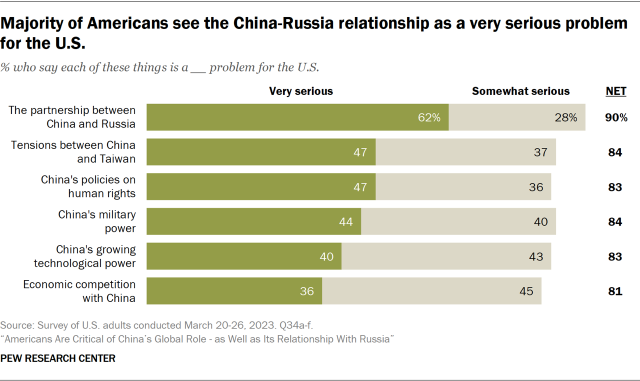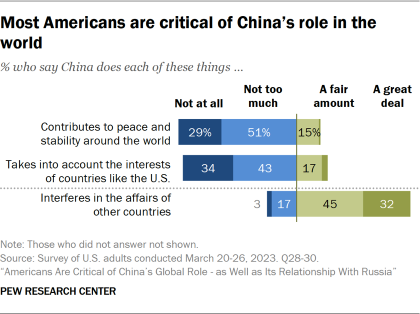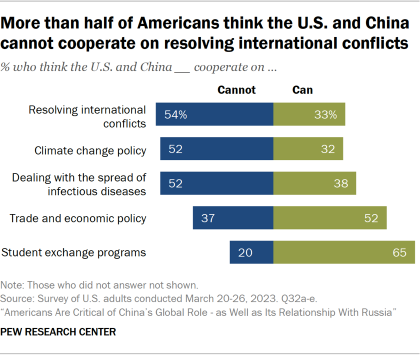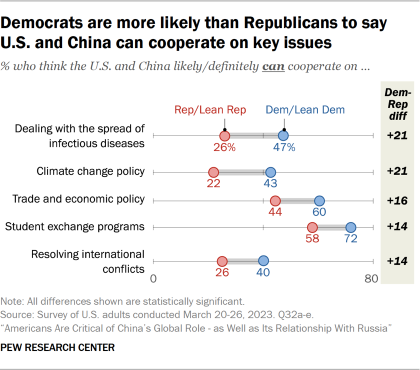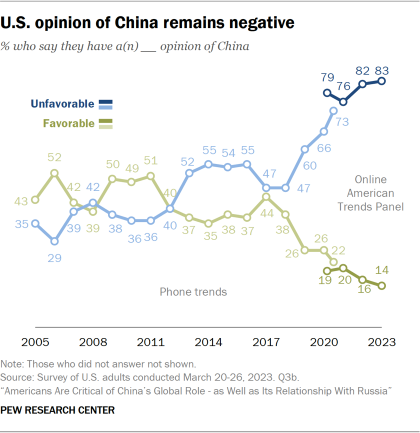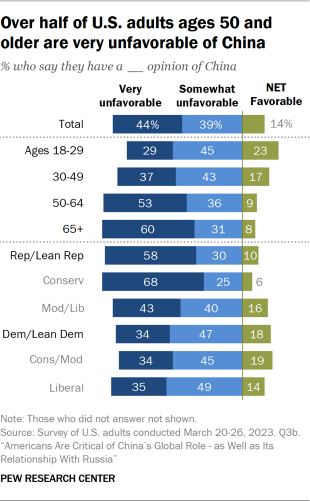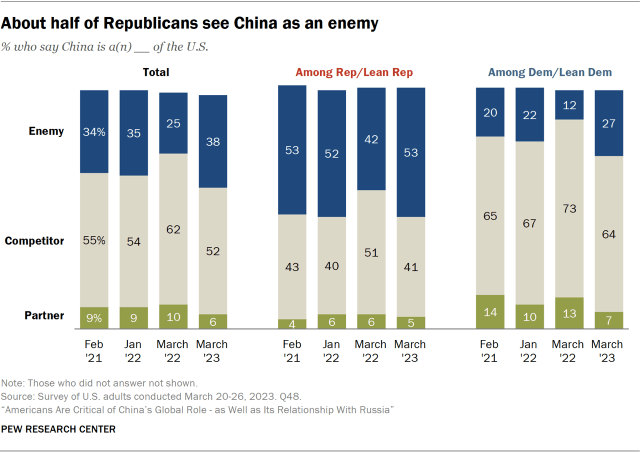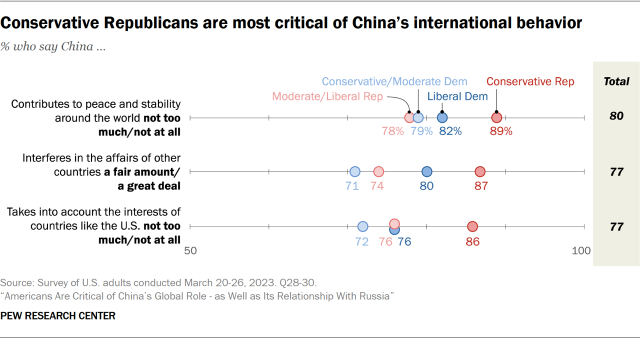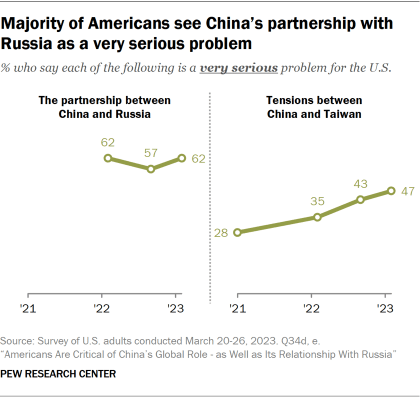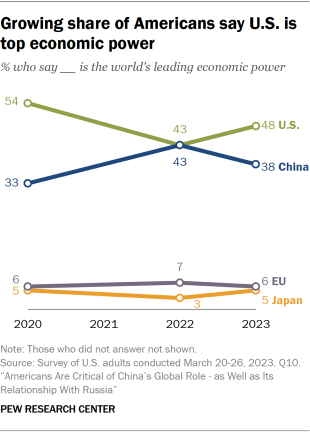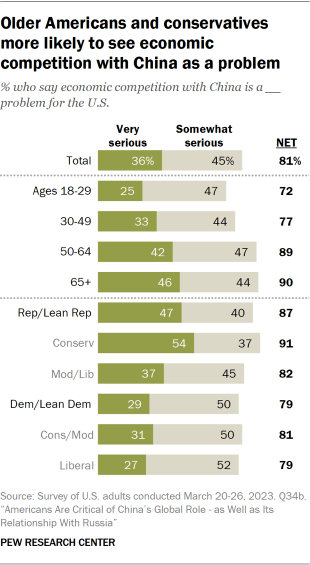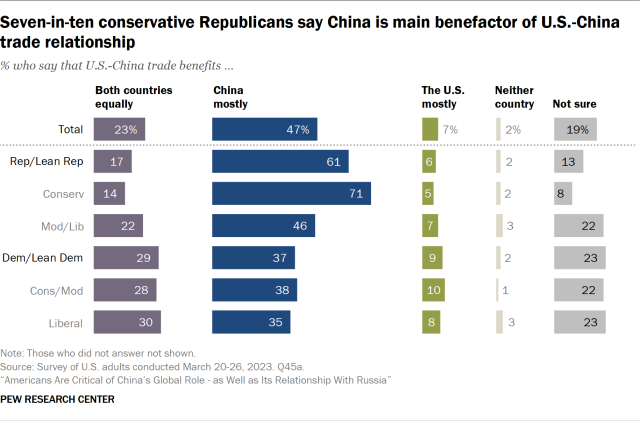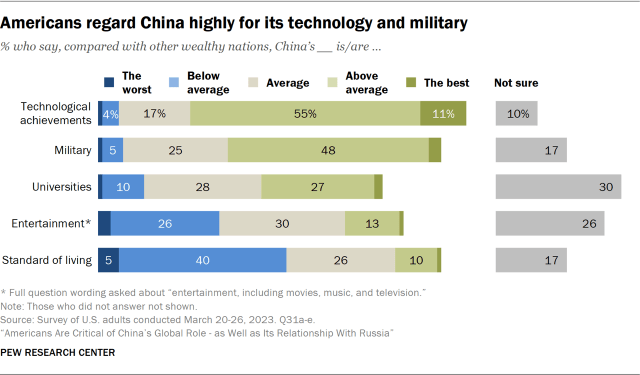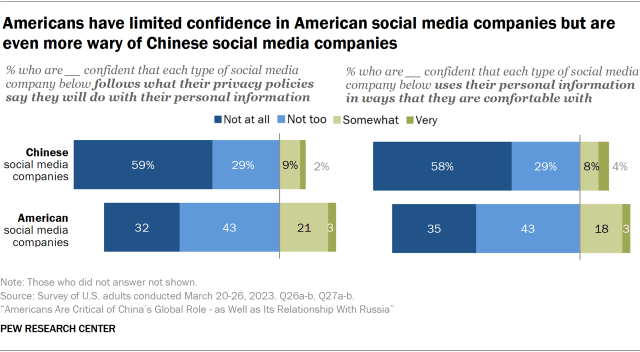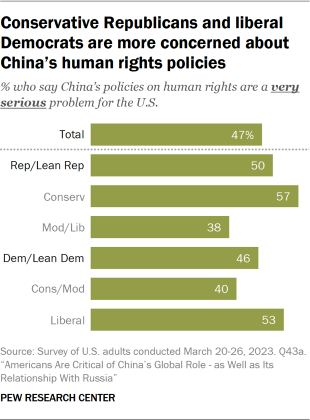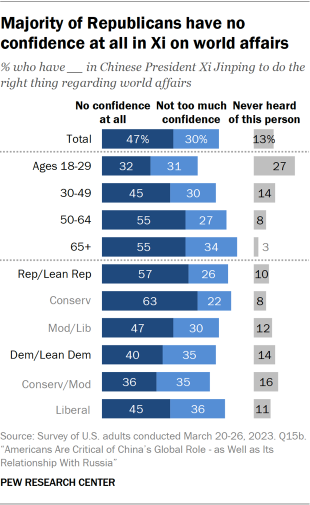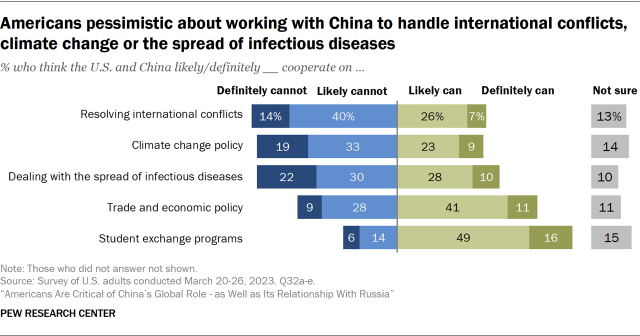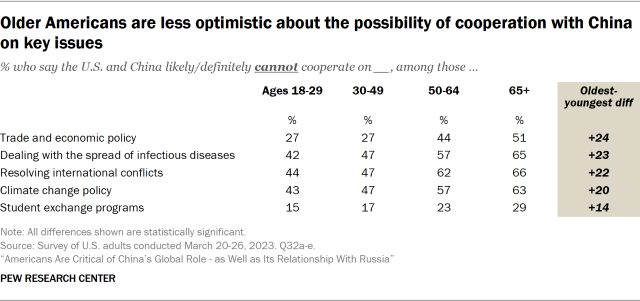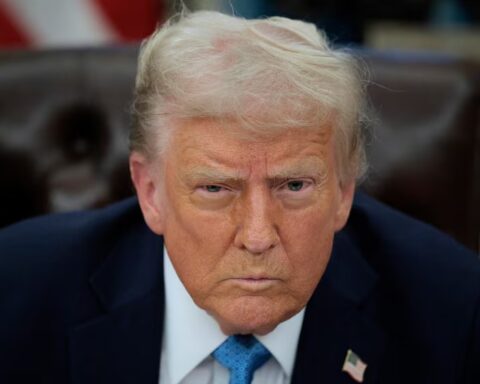Most see little ability for the U.S. and China to cooperate
A large majority of U.S. adults (83%) continue to have negative views of China, and the share who have very unfavorable views (44%) has increased by 4 percentage points since last year. Around four-in-ten Americans also now describe China as an enemy of the United States, rather than as a competitor or a partner – up 13 points since last year, according to a March 20-26, 2023, Pew Research Center survey.
Thank you for reading this post, don't forget to subscribe!People are broadly concerned about China’s role in the world, both geopolitically and in terms of specific issues. For example, in the wake of Chinese President Xi Jinping’s recent visit to Moscow to meet with Russian President Vladimir Putin, 62% of Americans see the China-Russia partnership as a very serious problem for the U.S., up 5 points since October and back to the original high levels seen in the immediate aftermath of the Ukraine invasion in 2022.
Concerns about tensions between mainland China and Taiwan are also elevated: Even before Taiwan’s President Tsai-Ing Wen visited the U.S., 47% described them as a very serious problem – a 19-point increase from the share who said the same two years ago. China’s policies on human rights are also a very serious concern for around half of Americans.
China’s growing technological power rates as a lower concern for many Americans than these other issues, though four-in-ten describe it as a very serious problem. Yet, around two-thirds of Americans are aware that TikTok’s parent company, ByteDance, is located in China, and by a more than two-to-one margin, more Americans support than oppose the U.S. government banning TikTok (28% are not sure). This is particularly the case among those who are aware the app is Chinese-owned or among those who have an unfavorable view of China.
Americans are also critical of China’s behavior on the international stage. Around three-quarters or more say China does not take the interests of other countries like the U.S. into account, that it interferes in the affairs of other countries and that it does not contribute to peace and stability around the world.
Republicans and Republican-leaning independents tend to see China’s role in the world in more negative terms than Democrats and Democratic leaners. Republicans are also more likely to describe all tested problems in the U.S.-China relationship as very serious for the U.S. relative to Democrats. In many cases, however, differences are somewhat muted. To give one example, when it comes to China contributing to peace and stability in the world, large majorities of both Republicans (84%) and Democrats (80%) say it does not do so much or at all. Where the parties differ most tends to be the intensity of the sentiment. Republicans are around twice as likely as Democrats to say China does not contribute to peace and stability at all (40% vs. 21%). And in terms of ideology, conservative Republicans are often particularly negative toward China, even relative to more moderate and liberal Republicans. Nearly nine-in-ten conservative Republicans say China does not contribute much or at all to global peace and stability relative to around eight-in-ten moderate and liberal Republicans.
Against this backdrop, Americans are somewhat skeptical about the possibility of cooperation with China. On issues like resolving international conflicts, climate change policy and combating the spread of infectious disease, Americans are more likely to say the U.S. cannot cooperate with China than say it can. However, there are two areas where Americans are more open to the possibility of collaboration with Beijing: student exchanges and trade and economic policy.
Not all groups are equally closed off to the possibility of cooperation, however. Democrats and independents who lean toward the Democratic Party, for example, tend to be much more amenable to working with China on all key issues mentioned than Republicans or GOP leaners.
“Most things are a stretch in terms of working on things together with them … I think if we want to work with China on anything, it’s probably going to have to be something economically beneficial.”MAN, AGE 25
Younger Americans, too, see more opportunities to work with China than older Americans, in keeping with past surveys that have found that younger people tend to have more positive views of China and tend to prioritize multilateralism. And while people with higher levels of education are actually more critical of China on myriad issues and have more negative views of the country, they, too, tend to be more open to U.S. collaboration with China on a few issues than people with less formal education.
These are among the key findings of a new survey conducted by Pew Research Center on the Center’s nationally representative American Trends Panel, among 3,576 adults from March 20 to 26, 2023. Other key findings include:
- Despite their relative openness to collaborate with China on trade and economic policy, Americans see China getting more out of the current bilateral economic relationship than the U.S. Around half of Americans (47%) say China benefits more from the U.S.-China trade relationship than America, while 23% think they benefit equally and 7% think the U.S. benefits more. And this is not just general skepticism about trade: When asked the same question about the U.S.-Canada trade relationship, around half (48%) of Americans say the U.S. and Canada benefit equally and only 14% think Canada benefits more.
- Few Americans have confidence in Xi to do the right thing in world affairs – including nearly half who say they have no confidence at all in him.
- China’s “hard” and “soft” power image in the U.S. is a mixed bag. About half of Americans see China’s military as above average relative to other wealthy countries. But when it comes to its “soft power” image, around two-thirds of Americans see China’s technological achievements as above average, but fewer say the same of its universities (29%) or pop culture (14%). And 45% see China’s standard of living as below average.
- Fewer Americans see China as the world’s leading economic power this year than last year. Today, 38% name China as the world’s top economy, compared with 48% who name the U.S.
U.S. adults continue to hold broadly unfavorable views of China
Negative views of China continue to be high: 83% of U.S. adults have an unfavorable view of the country, including 44% who are very unfavorable (the highest share who have expressed this opinion since the Center started asking this question on the online American Trends Panel in 2020). Just 14% have a positive view of China – the lowest share recorded since the move to the online panel.
Older Americans have more negative views of China than younger ones: 91% of those ages 65 and older say they have an unfavorable opinion of the country, compared with 75% of those 18 to 29. While older Americans’ negative feelings of China have remained largely unchanged in recent years, younger adults have turned slightly more negative over the past two years, increasing from 68% to 75% unfavorable.
Although young adults hold relatively warmer views than older people on China, focus groups conducted this past winter with young adults highlighted the nuanced, critical views that younger Americans have when it comes to China. They often see China as the “world’s factory,” whose economic strength makes them impossible to ignore. Young Americans also worry about possible threats – both militarily and in terms of cybersecurity – posed by China. Some young adults see the U.S. and China as locked in a competition on the world stage.
As has often been the case, Republicans and independents who lean toward the Republican Party are more likely to hold an unfavorable opinion of China (89%) than Democrats and Democratic-leaning independents (81%). Among Republicans, about two-thirds of conservatives are very unfavorable toward China, significantly more than the 43% of moderate or liberal Republicans who say the same. Majorities of Democrats are also more negative toward China than positive, though no more than about a third hold very negative views of the country.
U.S. adults with a college degree or higher education (87%) are also more likely to have an unfavorable opinion of China than those with some college or less (82%).
When asked to label China as either a competitor, enemy or partner of the U.S., Americans are most likely to say China is a competitor (52%). This is a 10 percentage point drop from a year ago, when 62% of Americans saw China as a competitor. The share describing China as an enemy, however, has increased 13 points, from 25% in March 2022 to 38% – the highest recorded since 2021. Just 6% consider China a partner of the U.S.
“We’re competing with China right now because it’s the U.S. versus China trying to spread their global influence.”MAN, AGE 25
Democrats are significantly more likely than Republicans to categorize China as a competitor (64% vs. 41%), though the share saying this has fallen 9 percentage points since last year. Concurrently, the share of Democrats that see China as an enemy has increased from 12% to 27%. Among Republicans, the prevailing view is that China is an enemy of the U.S., with 53% calling China an enemy – up 11 points from last year.
Older Americans are more likely than younger ones to call China an enemy: Around half of those ages 65 and older say this, compared with only around a quarter of adults under 30 (54% vs. 23%, respectively).
China’s international intentions are viewed negatively
Most Americans are critical of how China interacts with other countries. Eight-in-ten say China does not contribute much to peace and stability around the world, including roughly three-in-ten (29%) who say China makes no contributions at all.
Majorities of Democrats and Republicans say China contributes little to world stability, but conservative Republicans are more likely than other partisans to discount China’s contributions: 89% of conservative Republicans say China does not contribute much to world peace and stability. In comparison, around eight-in-ten moderate and liberal Republicans and Democrats of all ideological leanings say the same.
Younger Americans ages 18 to 29 are least critical of China’s contributions to international stability: 70% say China does not contribute much, compared with about eight-in-ten of those in older age groups who say the same. Americans with more formal education are also more likely than those who have less schooling to say China contributes little to peace and stability around the world.
A large majority of Americans (77%) say China puts little weight on the interests of other countries like the U.S. when making foreign policy decisions, with a third saying that China does not account for other countries’ interests at all. Conservative Republicans are more likely than moderate Republicans or Democrats to hold this view, as are older Americans and those with more education.
Three-quarters of U.S. adults also say China interferes in the affairs of other countries. This includes more than three-in-ten who say China interferes a great deal. A greater share of Republicans sees China as interfering at least a fair amount in the affairs of other countries than Democrats do, but significant divisions within parties are present. Conservative Republicans are most likely to say China interferes in other countries’ affairs, followed by liberal Democrats. Moderate and liberal Republicans are as likely as conservative and moderate Democrats to hold this view. Americans who are older or have more education are also more likely to say China interferes at least a fair amount.
Americans who see Taiwan favorably are more likely to say China interferes in the affairs of other countries. China recently warned Taiwan’s President Tsai Ing-Wen against stopping in the U.S. and meeting House Speaker Kevin McCarthy. It also previously responded to a visit by then-Speaker Nancy Pelosi to Taiwan in August 2022 with extensive military drills around Taiwan.
Concern about tensions in China’s relationship with Taiwan has also intensified, with a record high share of Americans saying cross-strait tensions are a very serious problem (47%). Such worries about a strained relationship between China and Taiwan are more common among Americans with a favorable view of Taiwan, as well as Republicans and those ages 65 and older.
“The biggest fear of all is Russia and China having unlimited power.”WOMAN, AGE 26
There is also a great deal of concern about China’s relationship with Russia: 62% say China’s partnership with Russia poses a very serious problem for the U.S., up 5 percentage points since October 2022 and a return to levels last seen in March 2022, as the war in Ukraine was beginning. Chinese President Xi visited Russia and met with Russian President Putin while the survey was being conducted in March. The Department of Defense also reported in February that China has not ruled out the possibility of providing “lethal aid” to Russia for use in Ukraine.
Republicans are more likely than Democrats to see China’s partnership with Russia as a very serious problem for the U.S., though at least six-in-ten in both parties hold this view. Older Americans are also more likely to see the partnership as a very serious problem.
Americans no longer see China as the world’s leading economy, but still see its economic strength as a problem for the U.S.
Americans are 10 percentage points more likely to call the U.S. the world’s leading economic power than China, a significant change from last year when the two were seen as equally powerful. Since then, China has seen measured economic growth after lifting its “zero COVID” policy.
Roughly half of Democrats (52%) say the U.S. is the world’s leading economic power, while a third say China holds the top spot. Republicans are more divided: 46% say the U.S. is the top power and 45% say it is China.
Men are more likely than women to say the U.S. is the world’s leading economic power (57% vs. 40%), and women are more likely to say China is the top economy (43% vs. 34%). Older adults are somewhat more likely to say the U.S. is the leading economic power than younger adults.
Still, Americans are generally concerned about economic competition with China. Roughly eight-in-ten (81%) say it is at least a somewhat serious problem, including about one-third (36%) who say this is a very serious problem for the U.S. Though this is a slight decrease in the share who say it’s a very serious problem since October 2022, the percentage of Americans who see economic competition with China as at least a somewhat serious problem has changed little since 2020.
Concern about economic competition is particularly high among those that call China the world’s top economy: 44% of Americans who see China as the world’s leading economic power say economic competition with China is a very serious problem. Roughly a third or fewer of those that view the U.S., Japan or the European Union in the top spot say the same.
“Five years ago, microchip companies in China were popping up like crazy and now there is a shortage for us and everything is so expensive because everything we want is technology but we have to rely on China to get those things.”MAN, AGE 29
Republicans are also more likely than Democrats to say economic competition with China is a very serious issue. This is particularly true of conservative Republicans, who are 17 percentage points more likely than moderates or liberals to see competition with China as a very serious issue.
When asked who benefits most from U.S.-China trade – the U.S., China, both countries or neither – nearly half of Americans (47%) say China gets more from the trade relationship. Just 7% think the U.S. benefits most. Another quarter of Americans (23%) say that both countries benefit equally, while only 2% say neither country does.
While Republicans are more likely than Democrats to say most benefits of U.S.-China trade belong to China (61% vs. 37%), Democrats are more likely than Republicans to say that both countries benefit equally from trade (29% vs. 17%). Men and older Americans are also more likely to see China as the main benefactor of trade, as are Americans with negative evaluations of the current economic situation in the U.S.
To test whether attitudes on the benefits of trade are more about China or trade policies in general, we included comparison questions on trade with Canada, the United States’ second largest trade partner. And Americans see the trade relationship with Canada as far more balanced. Nearly half (48%) think that both countries benefit equally – more than double the share that say the same about trade with China. Just 14% say Canada benefits more than the U.S.
Notably, there is no significant partisan difference in the shares that say both the U.S. and Canada benefit from trade with each other, though Republicans are more likely than Democrats to say that Canada is the main benefactor (20% vs. 9%, respectively).
Americans offer mixed review of Chinese ‘soft’ and ‘hard’ power
“Soft power” – or a country’s ability to influence by using the power of attraction – is commonly thought to involve people viewing a country’s technology, popular culture, universities and more in a positive light. When it comes to Americans’ evaluations of Chinese “soft power,” the picture is mixed. Americans are complimentary of China’s technological advancements but poorly rate or do not know its popular culture, and assessments of its universities and standard of living fall somewhere in the middle. Americans also see China’s military – or “hard power” – as relatively strong relative to other wealthy nations.
Two-thirds of Americans say China’s technological achievements are either the best or above average, relative to other wealthy countries. Another 17% describe them as average, with only 5% saying they are below average or the worst (10% say they are not sure). Views differ little across age groups, education levels or among partisans.
Nearly three-in-ten Americans think Chinese universities are above average and a similar share (28%) say they are average. Few (11%) say they are below average, and another three-in-ten say they are unsure.
Only 14% describe China’s entertainment, including movies, music and television, as the best or above average relative to other wealthy countries. Around a third (30%) say they are average, and a nearly equal share says these pop culture products are either below average or the worst (29%) (around a quarter say they are not sure). Younger Americans are somewhat more likely to compliment Chinese pop cultural products than older people, though older Americans are also much more likely to say they are not sure one way or the other.
“China doesn’t necessarily have higher standards of living.”MAN, AGE 20
Few Americans (11%) see China’s standard of living as high relative to other developed countries. While around a quarter say the Chinese standard of living is average (26%), a plurality of Americans (40%) say it’s below average. Republicans are more likely than Democrats to see it as below average or the worst in the world (52% vs. 41%), with conservative Republicans (56%) being somewhat more likely than moderate or liberal Republicans (48%), conservative or moderate Democrats (39%) or liberal Democrats (45%) to hold this view. Older people are also more likely than younger ones to see living standards in China as lower than those in other advanced economies.
Around half of Americans (51%) say that the Chinese military is either the best or above average, though few (3%) describe it as “the best” (in a 2021 survey, 44% of Americans described the American military as the best). Older Americans are more likely to describe China’s military as one of the best or above average: 60% of those ages 65 and older say this, relative to only around half or fewer among the other age groups. Republicans are more likely to describe China as a top military (56%) than Democrats (49%), with conservative Republicans particularly standing apart (59%) from moderate and liberal Republicans (51%). Men are also significantly more likely than women to hold this view (59% vs. 44%), though women are also more likely to say they are unsure.
Particularly when it comes to China’s military or its technology, though, China’s strength in these areas may not prove attractive to Americans, but rather might provoke concerns. For example, 84% of Americans describe China’s military power as either a very or a somewhat serious problem for the U.S., with 44% describing it as very serious. And people who see China’s military as one of the best in the world are much more likely than those who see it as less sophisticated to say China’s military power is a very serious threat to the U.S.
When it comes to China’s growing technological power, 83% of Americans describe it as a very or somewhat serious problem for the U.S., including 40% who say it’s very serious. Americans are also, by a more than two-to-one margin, supportive of the U.S. government banning TikTok. This support is related to views on China: Those who are aware that the app’s parent company, ByteDance, is located in China and those who have unfavorable views of the country are much more likely to support a ban of the social media platform.
“It is a big thing to me to ensure that Russia, or China or any other country, isn’t hacking us.”MAN, AGE 26
Americans also broadly distrust Chinese social media companies. Nearly nine-in-ten (88%) say they have little or no confidence in them to follow what their privacy policies say they will do with personal information, including 59% who say they have no confidence at all. A large majority (87%) also don’t believe Chinese social media companies will use their personal information in ways that they feel comfortable with – including 58% who have no confidence at all in these companies to handle their data. And, while some of this is indicative of general skepticism about how social media companies operate, Americans still have markedly less trust in Chinese social media companies to do these things than in American social media companies.
China’s human rights policies also drag down its image. Roughly half of Americans consider China’s human rights policies a very serious problem for the U.S. This is 5 percentage points greater than the share who said the same in October 2022. Those who say China’s human rights policies are a very serious problem for the U.S. are 15 points more likely than those who consider them a less serious problem to see China unfavorably.
Republicans are more likely than Democrats to see China’s human rights policies as a very serious problem, but substantial differences within each party are present. Conservative Republicans and liberal Democrats are both more likely than their more moderate counterparts to consider human rights policies in China a very serious problem.
Roughly half in the U.S. have no confidence at all in Xi Jinping
Roughly three-quarters of U.S. adults (77%) have no confidence in Chinese President Xi Jinping to do the right thing regarding world affairs, including about half (47%) who express no confidence at all. Just 8% in the U.S. have confidence in the Chinese leader. And 13% of Americans say they have never heard of Xi.
Pew Research Center has asked about opinion of Xi in the U.S. since 2014, about a year after he first took office. Across these phone and online surveys, Americans have consistently had little confidence in Xi. However, this year, due to the inclusion of an explicit option for respondents to say they have “never heard of this person,” results are not directly comparable with past surveys.
Older Americans – those ages 50 and older – are more likely than their younger counterparts to say they have no confidence at all in Xi’s ability to do the right thing regarding world affairs. For example, 55% of U.S. adults 65 and older hold this view, compared with 32% of those 18 to 29. However, younger Americans are more likely to say they have never heard of Xi (27%) than those in any other age group.
Confidence in the Chinese president also varies by partisanship: 57% of Republicans have no confidence at all in Xi, compared with 40% of Democrats. Among Republicans, conservatives are the most likely to have no confidence whatsoever in Xi (63%), compared with moderates or liberals (47%). And among Democrats, liberals tend to express less confidence overall in Xi (45%) than conservatives or moderates (36%).
Americans who have a college degree or more education have more negative views of the Chinese leader than those with some college or less (84% vs. 74%, respectively).
Cooperation between the U.S. and China seen as unlikely
“I don’t know what we could possibly work with them on. Certainly not the climate.”WOMAN, AGE 25
When asked about five possible areas for cooperation between the U.S. and China, Americans express skepticism about partnering together on most issues. Americans are more likely than not to say the U.S. and China cannot work together to resolve international conflicts (54%) or cooperate on climate change policy (52%). The U.S. and China previously issued a joint climate agreement in 2021, and climate talks between the two countries resumed late last year after being suspended over Nancy Pelosi’s visit to Taiwan.
A similar share say that the two countries cannot cooperate on dealing with the spread of infectious diseases. In 2020, about eight-in-ten Americans said China’s initial handling of the coronavirus outbreak in Wuhan contributed at least a fair amount to the global spread of the disease.
Americans are more optimistic about cooperating with China on trade and economic policy and on student exchange programs. At least half say the two countries can cooperate on each issue. Still, as recently as 2021, Americans thought it was more important for the U.S. to get tougher on China about trade and economic policy than to focus on building a stronger relationship. That same year, a majority of Americans supported limits on Chinese students in U.S. universities.
Republicans are more skeptical about whether the U.S. can work with China on these issues than Democrats are. The difference is greatest when it comes to cooperating on handling the spread of infectious diseases (65% of Republicans think the countries cannot cooperate vs. 43% of Democrats who say the same) and climate change policy (63% vs. 44%). Americans who say that the U.S. should not compromise with other countries when making foreign policy decisions are also more likely than those who say the U.S. should account for the interest of other countries in its foreign policy to say the U.S. and China cannot cooperate on each of the five issues.
As with other issues in the U.S.-China relationship, older Americans have more skepticism about the U.S. cooperating with China than younger Americans. For example, 51% of Americans ages 65 and older say the U.S. and China cannot cooperate on trade and economic policy, while 27% of Americans 18 to 29 say the same (a 24 percentage point difference).




